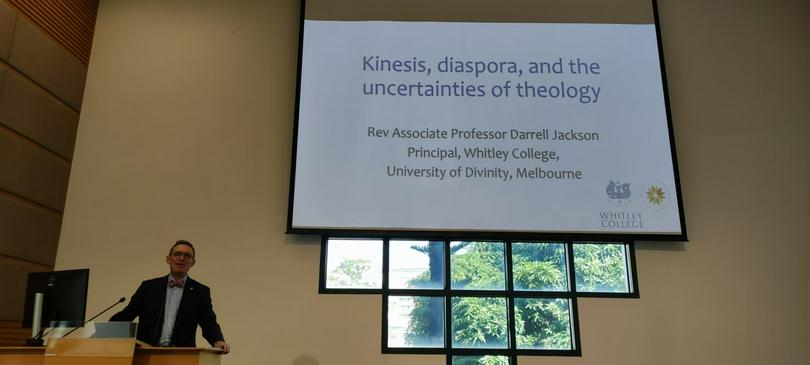Migrant theologian Rev. Dr. Darrell Jackson delivered a lecture titled “Kinesis, Diaspora, and the Uncertainties of Theology” at the Chinese Graduate School of Theology (CGST) on January 24. He argued that migration is not merely a peripheral issue but is deeply embedded in the narrative of the Christian Church, influencing its development and mission.
Dr. Jackson is the mission commission associate of the World Evangelical Alliance and vice-president of the International Board of European Christian Mission. Drawing on his research and personal experiences, Dr. Jackson examined the intricate relationship between migration, theology, and cultural identity in his lecture.
The lecture was part of CGST’s 50th-anniversary lecture series "Cultural Crossroads: Navigating the Dynamics of Intercultural Interactions" under "Josephine So Culture and Ethics Lecture."
Dr. Jackson presented the work of four migrant theologians in Australia, each representing a unique cultural background and theological perspective.
First, he introduced a Chinese theologian whose research examines the interplay between Chinese poetry and Gospel narratives, showcasing how cultural traditions can enrich theological understanding. Second, he discussed a Samoan-Australian theologian who interprets Ecclesiastes through the lens of diaspora, emphasizing the significance of cultural heritage in theological reflection.
Third, he presented a Sri Lankan-Australian theologian who delved into cultural hybridity and Christian identity, illustrating how migrant communities navigate their faith amidst new cultural settings. Lastly, he spotlighted a European theologian reflecting on the ethical challenges of conducting theology on indigenous lands, underscoring the responsibilities of faith communities toward the original stewards of the land.
Referring to the work of philosopher Thomas Nail, Dr. Jackson elaborated on the concept of "kinesis," or movement, proposing that migration and mobility are fundamental forces shaping social and theological frameworks. He suggested that societies should be viewed as “regimes of motion,” enabling a more dynamic interpretation of social and theological structures.
Dr. Jackson argued that the experiences of migration and diaspora are not peripheral but integral to the history of the Christian Church, compelling it to embrace its connection to migration and take on ethical responsibilities toward migrants.
He concluded by advocating for a theology that celebrates movement, diversity, and the voices of marginalized communities, asserting that these perspectives can profoundly enrich theological discourse and make it more relevant to contemporary contexts.
After Dr. Jackson's lecture, Dr. Johnson Yip, an assistant professor specializing in Ezekiel studies at CGST, offered a response.
Dr. Yip praised Dr. Jackson’s examination of the complex relationship between migration, theology, and cultural dynamics. He commended Dr. Jackson’s critique of Eurocentric assumptions in traditional theological frameworks and his call for a more inclusive approach to theology in diasporic contexts.
Dr. Yip noted that Dr. Jackson’s spotlight on four theologians from diverse cultural backgrounds effectively illustrated how their diasporic experiences shaped their identities and theological insights. He further emphasized the dynamic, kinetic nature of contextual theology, molded by the movement and lived experiences of people.
Dr. Yip also highlighted Dr. Jackson’s innovative perspective on understanding apostolicity in the context of migration. Drawing on the biblical books of Jeremiah and Ezekiel, Dr. Yip illustrated how these texts are profoundly influenced by themes of migration, including forced deportation and the longing for return. He stressed that migration has always been central to the biblical narrative, offering valuable insights for contemporary theological reflection.
The following Q&A session provided valuable insights into the complexities of migration and theology. In response to a question about the challenges of self-reflection among migrants, particularly within Chinese communities, Dr. Jackson emphasized the importance of embracing diverse migrant experiences and moving beyond Eurocentric theological frameworks. Addressing a question on racism and colonization in Australia, he called on Christians to critically examine their biases and foster more inclusive communities. He also highlighted the struggles of non-Christians entering Christian spaces and stressed the need to create environments where all voices are genuinely valued. The session concluded with a call for continued dialogue, emphasizing the importance of inclusivity and shared reflection in addressing these pressing issues.












